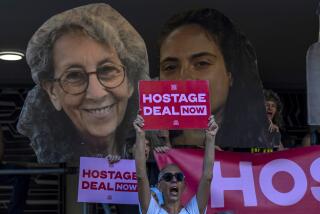Palestinians skeptical of new round of peace talks
Reporting from Ramallah, West Bank — As Palestinian Authority President Mahmoud Abbas prepares to embark down a well-trod path of peace talks — a road he’s spent a career helping to pave — the pragmatic leader is risking his political future in what some predict could be his last trip to the negotiating table.
It’s little wonder Abbas has responded with ambivalence to the U.S.-sponsored direct talks, set to begin Thursday in Washington.
After months of hesitation, Abbas agreed to participate only after heavy American pressure and despite deep pessimism among his own people and supporters. Less than 25% of Palestinians believe the talks will yield results, a recent poll found.
With Palestinian frustration high after a string of failed negotiations over the last decade, Abbas’ political future may hang in the balance, dependent on whether he can deliver Palestinian statehood and vindicate his dogged pursuit of peace talks, rather than violent resistance, as the only viable path.
“He’s really putting himself out on a limb,” said former Abbas advisor and Palestinian analyst Diana Buttu. “His decision to enter talks is incredibly unpopular with Palestinians. Unless he can somehow pull a rabbit out of his hat, his credibility will be lost. The stakes for him are very high.”
Leaders in the rival Hamas movement, which controls the Gaza Strip, have branded Abbas a sellout and called for his resignation after five years in office. Even some of Abbas’ supporters in the more moderate Fatah party are questioning his decision to soften his demand for Israel to halt housing construction in the occupied West Bank as a precondition to joining the talks.
“This decision to go to talks is very risky for him because it exhausts all the capital he has,” said Khalil Shikaki, a Palestinian pollster and analyst. “He is much weaker today than he was a week ago. He has to deliver something concrete.”
Shikaki said support among Palestinians for peace talks is falling, while support for a return to violence is growing. He said another round of failed talks could mark a turning point. “We are seeing the end of diplomacy and [Abbas is] the embodiment of diplomacy.”
Inside Fatah, an emerging faction of leaders could become emboldened if talks collapse, Shikaki and others said. “They’re just waiting for him to fail,” Shikaki said. “Over time, the perception will grow that [Abbas] is hurting Fatah and they needed to distance him.”
Abbas and his supporters concede that chances for success are slim, but they predict that Israel, not Abbas, will shoulder the blame if talks fail.
A key test will come as soon as Sept. 26, when Israel’s 10-month moratorium on most new housing construction in the West Bank ends. If Israel does not extend the freeze, Palestinians will pressure Abbas to quit the talks. U.S. officials are working toward a compromise.
Abbas has defended his decision to return to the negotiating table.
“If there’s a 1% chance to achieve peace, we will go for it out of conviction, because we want to achieve peace with our neighbors,” he told reporters at his presidential compound here Friday.
Supporters warned against underestimating the 75-year-old Palestinian leader. Despite his repeated threats in recent years to resign, Abbas is a political survivor who has resisted efforts inside Fatah to identify and groom his successor.
As a result, he is seen as the only credible Palestinian leader, particularly by the West, where he enjoys strong support from the U.S. and others.
According to polls, Abbas has strengthened his base over the last year in a theoretical match-up against Hamas leader Ismail Haniyeh. A June survey taken in both Palestinian territories gives Abbas 54% to Haniyeh’s 39%, according to the Palestinian Center for Policy and Survey Research. At the same time, Abbas’ popularity lags that of Marwan Barghouti, a leader of past Palestinian uprisings who is serving a life sentence in an Israeli prison.
Palestinian Authority spokesman Ghassan Khatib downplayed speculation that the negotiations’ failure would strike a blow to Abbas. “Negotiations are not the only thing in Palestinian strategy,” he said.
But independent commentator and newspaper columnist Hani Masri, who is close to Fatah and Abbas, called the upcoming talks “political suicide” and said Abbas had failed to develop alternative strategies. “Abu Mazen always says that the alternative to negotiations and to the failure of negotiations is more negotiations,” he said, using Abbas’ nickname.
Other Palestinian leaders are known for advocating different approaches. Palestinian Authority Prime Minister Salam Fayyad has suggested building strong government and security institutions, and unilaterally declaring statehood in 2011 in the hopes that world powers will recognize the new entity. Others have pursued civil disobedience and challenging Israel’s occupation in international courts.
In Gaza, Hamas and other militant Palestinian factions continue to keep the use of violence as an option.
Independent Palestinian legislator Mustafa Barghouti said Abbas was putting too much faith in President Obama’s ability to secure a deal within a year.
“There’s an overreliance on external support,” said Barghouti, a distant cousin of Marwan Barghouti. “As the leader of Palestinians, Abbas should be listening to the people.”
But should Abbas reach a deal, Barghouti acknowledged, the Palestinian president’s legacy will be secure. Referring to the 12th century Muslim hero, Barghouti said, “If he gets us a state, he will be Saladin.”
edmund.sanders@latimes.com
Special correspondent Maher Abukhater contributed to this report.
More to Read
Sign up for Essential California
The most important California stories and recommendations in your inbox every morning.
You may occasionally receive promotional content from the Los Angeles Times.










